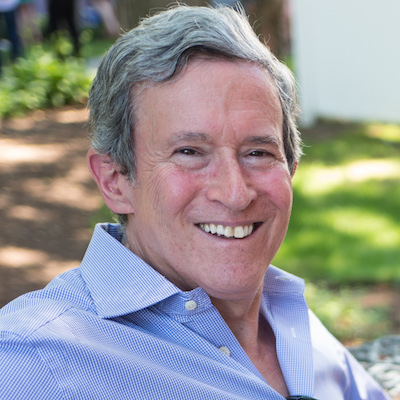Science and Justice Fellowships
Building Just Futures
Goldman Sachs gift funds science and justice fellowships

Alumnus Robert Mass hopes the new Science and Justice fellowships he arranged will train future engineers, artists, and scientists to assess hidden implications of their work.
At Mass’ direction, Goldman Sachs Gives, the investment bank’s charitable foundation, pledged to fund five Ph.D. candidates to participate in the intensive summer training. They’ll work together with students and faculty from all areas of study. In a seminar setting, the group takes on topics like big data or genomics, develops an understanding of critical challenges and collaborates on responses.
Mass (Stevenson ‘75, politics) hopes the program creates frameworks society can use to evaluate ethical questions. And he’s excited to be sending students to spend a summer studying them.
“The funding for the fellowships is to give people the leisure to dig into these issues and take them out into the real world when they graduate,” he says.
Ethics in genomics
Mass’ became interested in the Science and Justice program after reading the most recent book by its director, Jenny Reardon. In The Postgenomic Condition: Ethics, Justice, Knowledge After the Genome, Reardon challenges the accelerating growth of genomic technologies.
“It identified problems I wasn’t sure were widely known and suggested directions without being preachy,” Mass says.
One of the areas Reardon discusses in her book is the potential for problems years from now for people who participate in genetic tests that reveal their potential for health problems. Mass notes that information could someday affect participants’ access to health insurance.
“Should we be allowing people to have that test willy nilly? Should we give them counseling before they decide to be tested, since a test could change their life?” he asks. “My guess is not everyone who sends their saliva to 23andMe has really thought through the implications.”
Mass and Reardon discussed the Science and Justice Research Center after Reardon gave a talk in New York in early 2018. Goldman Sachs Gives began funding the fellowships a few months later.
Lessons from the Great Recession
For Mass, the fellowships fall in line with decades of informal study of ethics that reached a crescendo following the financial crisis that began in 2008. Mass is a senior member of Goldman Sachs’ compliance division, which he says focuses on the ‘Should we?’ question (what kind of business “should” the firm do—as opposed to simply what it is legally permitted to do). From that perspective the crisis provided indelible lessons about what the finance industry had done well and what it had done poorly—including failing to comprehend potential outcomes of some of its practices.
“I’ll never forget. It was a real wake-up call,” he says.
Since then Mass has helped Goldman Sachs build policies to make sure the company assesses the wider implications of its actions.
“Only when things really break down do you see what you need to fix and what you need to do before the next time,” he says.
Learning to love learning
Mass’ credits his own study of ethics indirectly to his education at UC Santa Cruz. He was an undergraduate student at a time in the University’s history when professors didn’t give grades. He had been accustomed to studying only for grades, and it took him time to learn how to be motivated to learn without that feedback. Gradually, he says his goal shifted to pursuing learning for learning’s sake alone and that lesson has stayed with him.
“The most important thing is to figure out what is true. I’ve spent 30 to 40 years furthering my education in pursuit of that goal,” he says. “That’s because of UC Santa Cruz.”
